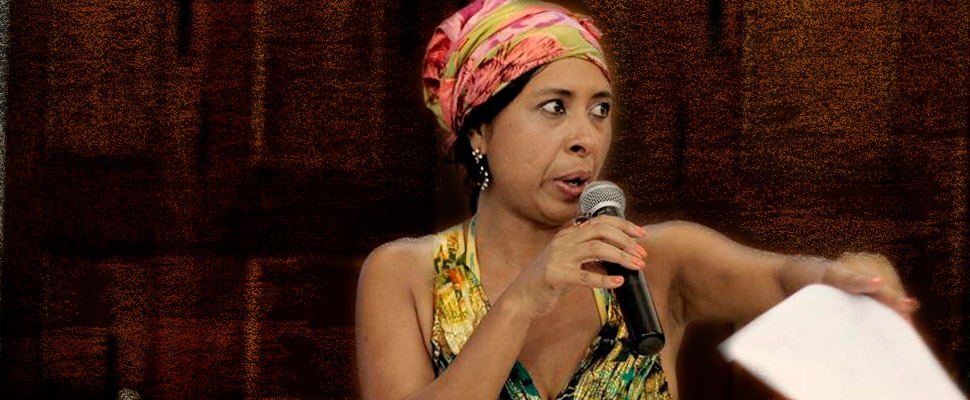Claudia Canto: portrait of an empowered woman
Listen this article
Directly from the Brazilian periphery of Sao Paulo, the living testimony of a former domestic worker who decided to face reality to change history

Although we do not choose the place we are born, you can build another destiny and beat difficulties. This is the case of Claudia Canto, an enterprising woman, smiling, full of projects. As a former domestic worker, she suffered mistreatment and human denigration. Far from doing nothing, she made this situation the axis of her strength, as she describes in Morte as Vassouras (Death to the brooms), her first book.
Leer en español: Claudia Canto: retrato de una mujer empoderada
Nancy Castellanos: How and in what way did you manage to start a new life?
Claudia Canto: Morte as Vassouras reflects the experience lived in Portugal working as a maid for extremely archaic and prejudiced employers. For them, the employees are like another piece of furniture in the house: without life, without opinion, without rights. I felt involved in a kind of involuntary exile … without freedom, it is impossible to continue. I wrote it at twenty-five, it was translated into English and it goes for the fourth edition. I had the pleasure of presenting it in three of the largest educational/academic establishments in the United Kingdom: the Universities of Oxford, Glasgow and Kings College in London. It is also used as support material in various schools.
I feel ‘a spider’ weaving a great web of people. Acting from my nature, essence, and truth.
NC: As a ‘motivational storyteller’, lecturer, writer, TV co-producer and now a member of the Contemporary Academy of Letters of Brazil, holder of the ‘Mergulho na Vida‘ Program, what are, in your opinion, the central points for female empowerment?
CC : First of all, it has to do with my evolution, the breaking of paradigms and concepts. From there to contribute in the history of other people. I perceive that we are discovering and building together, in connection with other human beings, as if it were an immense therapeutic office of souls…
Undoubtedly, self-esteem is fundamental, as the valorization, sense of one’s existence, the sacred feminine, the laws of nature, creative economy, gratitude … and quantum vibration …
Our round-trip talk is tracing luminous bridges in cyberspace … Claudia continues to live in her beloved city of Tiradentes, a great influence for her literary universe and does not intend to move. “It is a cultural granary, full of entrepreneurs, who even without resources, manage to live creatively and prosper. Because it was in Tiradentes where she could have a bathroom for the first time inside the house. Only those who lived in favelas know the importance of having a home.” Her face radiates serenity, sweetness; her clear, simple and genuine word acquires that forcefulness that reaches the heart. Tireless, with attitude and a big smile, the protagonist of our report evokes with special affection ‘the German’: Thomas Mielenhausen, her mentor. “I had the pleasure of meeting him in the Ibirapuera Park sixteen years ago (…) Thomas taught me everything, from how to behave at the table, to grammar, spelling, the importance of reading, took me to theaters and museums, etc. Thanks to him I was able to launch my first book at the Universities of Oxford and Glasgow dressed as a maid. I learned what the true feeling of gratitude means that is as intense and important as love.
NC: What is your opinion about feminist currents that reject men simply for being men?
CC: I particularly think that men should participate in movements, so that they can become aware of the importance of the role of both for the balance of society. Separating was never a good philosophy.
Read also: Interview with Carime Muvdi, author of How to Look and Feel Fabulous after 50
NC: Violent men are also born of women. In what way can mothers raise their children to share friendship, etc. What do you propose about it?
CC: The values transmitted by parents or guardians are very important, but they are not the only ones. The education we receive at home is not entirely responsible for the formation of our character. The construction of a personality is a complex and subjective task. We are a set of genes, books, society, traditions, and customs. And the world is extremely sexist, and this reality is reproduced every day in the media. It is a great network that subjugates the female sex. We need to act on all fronts, to guarantee the deconstruction of sexism.
NC: Do you think there are political tools that only democratic governments can implement?
CC: Yes, the diffusion of propaganda for the encouragement of respect between individuals, through TV and radio programs, promoting debates, and mainly from a policy of awareness in schools, beginning with the primary cycle.
The report advances with the endearing cadence of a ‘samba’. Well predisposed for dialogue, she comments with sympathy on her adopted pup ‘Banzé’ and how she enjoys taking him for a walk in the park. The protagonist of our history of self-improvement generously and attentively provides her time beyond agendas, conferences, and other projects in the folder. Claudia knows what it is to fight for a life that deserves to be lived, beyond her own. She does not stop getting excited when she refers to the recognition obtained from the Contemporary Brazilian Academy of Letters. “I was distinguished with the Honorary Member diploma, and the number forty-one seat. Recognizing the role of the writer in society is essential.”
NC: In May you travel to Portugal for the presentation of Death to the Brooms at the Feminist University. What significance does this new step acquire in your human, professional development?
CC: I feel it will be one of the most interesting moments of my career. I am very anxious, but at the same time I know that I am on the right path. The time has come for Portugal to know our literature. I want to tell that story from the bottom up.
NC: As a citizen of a Latin American country where music, culture in general have its own identity, what artists could you recommend?
CC: The advantage of Brazilian multiculturalism is the cauldron of culture and the arts that we have. I appreciate good independent genre music, lately, I’m listening to Adriana Calcanhoto, Marisa Monte and classics of the MPB (Brazilian Popular Music).
NC: For those who wish to communicate with you, where can they find you?
CC: They find me on all social networks as: Claudia Canto, writer, and palestrante. claudiacantojornalista@gmail.com
As Clarice Lispector once wrote: “To overcome is precise, to move forward is essential. Looking back is a waste of time. The past if it were good would be present.”
 [/carousel_item][carousel_item ]
[/carousel_item][carousel_item ] [/carousel_item][carousel_item ]
[/carousel_item][carousel_item ] [/carousel_item][carousel_item ]
[/carousel_item][carousel_item ] [/carousel_item][carousel_item ]
[/carousel_item][carousel_item ] [/carousel_item][carousel_item ]
[/carousel_item][carousel_item ] [/carousel_item][carousel_item ]
[/carousel_item][carousel_item ] [/carousel_item][carousel_item ]
[/carousel_item][carousel_item ] [/carousel_item][carousel_item ]
[/carousel_item][carousel_item ] [/carousel_item][carousel_item ]
[/carousel_item][carousel_item ] [/carousel_item][/carousel]
[/carousel_item][/carousel]
LatinAmerican Post | Nancy Castellanos
Translated from “Claudia Canto: retrato de una mujer empoderada”





